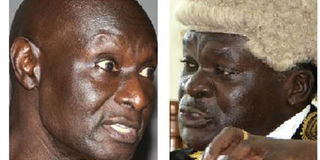Prime
Suspects not obliged to provide evidence to CID officers - court

Former UPC party president, Dr Olara Otunnu (complainant) and Deputy Chief Justice, Alfonse Owiny-Dollo. FILE PHOTOS
What you need to know:
Ruling. The ruling followed a 2010 petition filed by the former Uganda Peoples Congress party president, Dr Olara Otunnu, in which he challenged Section 27A Sub-section 3 and 4 which gave Police authorities powers to issue summonses for suspects to appear before CID headquarters.
Kampala. The Constitutional Court judges led by Deputy Chief Justice Alfonse Owiny-Dollo, have in a landmark judgment, struck out sections of the Police Act that require suspects to provide evidence to police during questioning.
In the April 18 unanimous decision, the judges also said a penalty provided in the Police Act against suspects who fail to honour summonses or produce documents required by interrogators is unconstitutional.
“The impugned provision imposes a penalty upon a person summoned for failure to comply. Such a person could be prosecuted. Clearly, this would defeat the purpose and intention of the (Police) Act. Compelling a person who is not yet suspected to have committed any criminal offence to appear before a police officer at a police station, to answer questions and produce documents would be inconsistent with and in contravention of Article 23(1) of the Constitution,” Justice Kenneth Kakuru ruled in the lead judgement.
Such limitation, the court decided, is not “necessary to protect the rights of others or to protect the public interest”.
“It is, therefore, not acceptable or demonstrably justifiable in a free and democratic society ,” added Justice Kakuru.
The other judges on the panel; Justice Owiny-Dollo, Justice Egonda-Ntende, Justice Cheborion Barishaki and Justice Ezekiel Muhanguzi unanimously concurred with the decision.
The judgment followed a 2010 petition filed by the then Uganda Peoples Congress (UPC) party president, Dr Olara Otunnu, in which he challenged Section 27A (3) & (4) which gave Police wide-ranging powers to summon, compel appearance and production of evidence by witnesses. Non-compliance under provisions of the Police Act that court has quashed, gave detectives powers to jail or impose monetary fines on a person.
The judges said for a penalty to be legal, the offence to which it applicable must be provided in law, which was the case with the Police Act penalty.
They, however, decided that police summoning individuals, even when it limits freedoms, is not unconstitutional. Dr Otunnu ran to court in April 2010 after Police summoned him four times to appear at CID headquarters in Kampala but choose to defy basing on the reason that it was unconstitutional.
Background
Dr Otunnu in his petition to the Constitutional Court argued that some actions of the Police Act were illegal and the summonses to CID for questioning were politically motivated to harass and intimidate him and to prevent other Opposition members from freely traversing Uganda.
The congressman had been summoned on claims that while appearing on a radio talk show in Lira District on April 12, 2010, he uttered defamatory words against President Museveni. Police authorities accused him of committing an offence of promoting sectarianism contrary to the Penal Code Act.
But in his appeal which was heard by a coram of five judges, the petitioner sought for a permanent injunction restraining the CID from compelling persons suspected of committing offences from being required to make statements on allegations labelled against them.
Speaking on behalf of the coram, Justice Kakuru, ruled that the protested provisions of the Police Act do not define the offence committed and is ambiguous thus it is in contravention of Article 28(12) of the 1995 Constitution, which provides no person shall be convicted of a criminal offence unless the offence is defined and the penalty for it is prescribed by law.
Speaking to Daily Monitor after the court session, Dr Otunnu said this was a landmark ruling for Ugandans who have always been intimidated to appear at the CID.
Judgment
The judges also noted that the remaining subsections of the impugned provisions are not inconsistent with and in contravention of Articles 23(1), 28(1), 29 (1) (a) (b) (d) and (e, 29(2) (a) and (b) and 38 of the Constitution as alleged by the petitioner.
Article 29 (1), (a) (b) (d) and (e) of the Constitution guarantees the right to freedom of speech, expression and freedom to assemble and to demonstrate together with others peacefully and unarmed and petition. I do not find this relevant to the provisions of the impugned provision.




